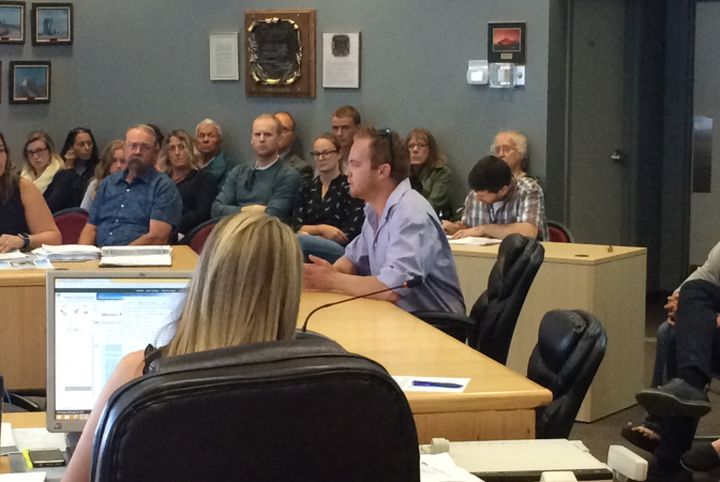Tyler Marshall’s second attempt to establish a kennel on one of his properties in Vulcan County has again been refused by the county council.

Marshall, who is facing charges from the Alberta SPCA related to properly caring for animals, was denied a kennel permit in June after more than 200 letters were submitted to the municipal planning commission opposing his application.
READ MORE: Dog-breeding kennel application denied for Alberta man charged by SPCA
The Calgary Humane Society (CHS) was one of the most vocal opponents, expressing concern about the welfare of the animals that would be raised and subsequently sold at what they characterized as a “puppy mill.”
He then appealed that decision on Aug. 3. His lawyer Brendan Miller wrote in a letter to the county that Marshall was “ambushed” by the CHS at his initial application meeting.
Marshall previously said through his lawyer that he would contest the charges.
More than 200 animals were seized from Marshall’s property in April, including 131 dogs, 62 rabbits, eight cats and three tortoises.
Several of those dogs were returned to Marshall in June in accordance with county bylaws, while more than 100 were put up for adoption.
- Owners of Calgary jewelry store say they were scammed thousands during POS purchase
- Calgary man in life-threatening condition after crash involving motorized scooter
- Calgary police tight-lipped on investigation into suspicious deaths in Redstone
- ‘Difficult news’ as Imperial announces speedier shutdown of N.W.T. oilfield
In the refusal of the appeal, the Vulcan County Regional Subdivision and Development Appeal Board gave several reasons for its decision.

Get breaking National news
Those reasons included the board finding inconsistencies with Marshall’s application and the information submitted by Marshall and/or his counsel. Those inconsistencies surrounded the number ages and breeds of dogs that would be housed in the premises, as well as a lack of clarity about the land that was to be developed.
The board also stated the application was incomplete when it came to establishing the “possible impacts of the proposed development” on the community.
READ MORE: Man charged after massive animal seizure applies to start dog-breeding facility in Alberta
The board also said it “deems it appropriate” to have heard those submissions from the CHS and other non-residents of Vulcan County, as “the board must hear ‘any other person who claims to be affected by the order, decision or permit.'”
The decision also outlined that though Marshall’s alleged behaviour was at the centre of much of the protest over this permit application, the committee was limited to “consideration of the proposed use rather than consideration of the user, Mr. Marshall.”
Marshall’s lawyer called the appeal board’s decision “informative, as well as positive,” in an emailed statement to Global News.
He commended the board for considering the location of Marshall’s facility, rather than his ability to operate the facility or his business.
Miller added that the board’s points about how Marshall could re-apply for a kennel permit showed it didn’t “succumb to the many activists misguided attempt to turn a municipal kennel licensing matter into the forum about the debate of whether canine breeding and sale facilities should be permitted in Alberta.”
He also said it showed that should Marshall re-apply and take the right steps and address things that were missed in his first application, his application could possibly be approved.
Miller said his only issue with the decision was the appeal board allowing the submissions from the CHS, which he said personally attacked his client.
“The reasoning for this was that the Appeal Board has jurisdiction to consider any ‘oral or written evidence’ it chooses,” Miller said.
He went on to say the letters from the public that the CHS requested people send and email, as well as those that attended the meeting, “did not present any evidence.”
“The Appeal Board did, however make a fair ruling none the less in the grand scheme of things but, in my opinion, erred in permitting activists from outside Vulcan County to make submissions,” he said, adding that no neighbours living close to Marshall’s property opposed the facility.
Miller called on the province to come up with a “comprehensive legislative scheme” to deal with canine breeders so individual municipalities don’t have to come up with regulations. He also said the Animal Protection Act is in “dire need” of updating.
Lastly, Miller said he sees the position the Calgary Humane Society and the Alberta SPCA take where seized animals are put up for adoption without the owners’ consent or a court order is against the Alberta Bill of Rights.
“If you’re going to be deprived of your property, you’re entitled to due process,” Miller said.
The CHS posted about the decision on its Facebook page Thursday, calling it “great news.”
“Thank you to everyone who wrote letters and for your ongoing support!” the post reads.
When Global News called the group for comment, a spokesperson forwarded the request to the Alberta SPCA, who declined to comment.








Comments